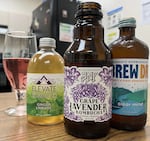A new bill in Congress would shield the kombucha industry from some federal alcohol taxes. Its co-sponsors in Oregon say they’re trying to support small businesses.
On Nov. 30, Oregon Sen. Ron Wyden and Rep. Earl Blumenauer reintroduced the KOMBUCHA Act.

"As a fermented beverage, kombucha contains trace amounts of alcohol (<.5%)," reads the label for BNF's bottled kombucha. "If you are trying to avoid alcohol entirely, do not consume."
Nathan Wilk / KLCC
Currently, beverages starting at 0.5% alcohol by volume (ABV) are considered alcoholic, and their manufacturers have to pay an excise tax. The bill would exempt kombucha from those rules if it has less than 1.25% ABV, or about a quarter of the potency of an average beer.
Supporters say kombucha is rarely consumed for its alcohol content, but it can ferment past the legal limit on the shelf.
“Kombucha is not the same as beer or other alcoholic beverages, and it shouldn’t be taxed the same way,” Wyden said in a press release.
Kevin Warren, the founder of BNF Kombucha & Jun in Eugene, said there’d be pros and cons to the change. He said the current rules discourage traditional methods that enhance flavor and carbonation.
“You can’t really do things like a secondary fermentation, which increases the alcohol content,” he said.
However, Warren said he’s worried the higher limit could negatively impact children or customers who are trying to abstain from alcohol. And he said it’s already possible to keep the levels within current standards.
Warren said while larger companies can pay for the same expensive equipment as the nonalcoholic beer industry, BNF was able to develop a proprietary way of controlling alcohol that’s more affordable.
“It took quite a bit of time to figure that out,” said Warren. “But you certainly don’t need a million dollar machine.”
This is the fourth time the KOMBUCHA Act has been introduced since 2017. It comes amidst industry growth— the market impact is projected at over $5 billion by 2025, according to Wyden and Blumenauer.
Warren said kombucha could be the new soda with less sugar. He said word’s getting out.
“I’ve seen a spike in demand for it,” he said. “I think people are just looking for healthier alternatives overall.”